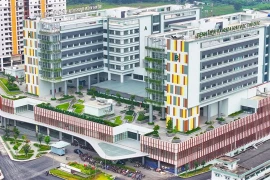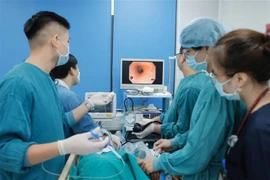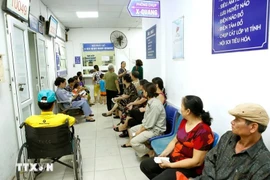Hai Duong (VNS/VNA) - 'Smart and Sustainable Hospitals' was the main topic of discussion at the annual conference of hospital directors in the northern provinces, recently held in the northern province of Hai Duong.
With a focus on patient-centred care, the April 18-19 meeting aimed to bring satisfaction, safety and the best medical services to patients, meeting people's medical examination and treatment needs.
Speaking at the event, Deputy Minister of Health Tran Van Thuan asked hospitals to apply the digital transformation, operate transparently and effectively in real time, and build smart hospitals with patients at the centre.
“The health sector needs to effectively utilise all resources from the State budget, health insurance, public-private partnership and socialisation to increase investment in grassroots health care, ensuring that people in all regions have access to essential, high quality and safe health services. All aim to ensure that every citizen receives a regular health check-up every year, gradually moving towards the extremely humane and noble goal of free hospitalisation for all people according to the policies and directions of the Party and State leaders."
He said that in recent years, the hospital system nationwide has made many changes in management, improving both service quality and the application of technology, but there are still many shortcomings. Although bidding and procurement of drugs and medical equipment have improved, there are still places where there is a shortage of drugs and supplies, affecting professional activities. The financial mechanism and implementation of autonomy are still inadequate. Some units face many difficulties in balancing finances.
In addition, the current health insurance payment mechanism, technical and economic norms and service price framework are not suitable for the actual costs incurred at hospitals. In many hospitals, the digital transformation has achieved initial results, but implementation is uneven, and there is a lack of skilled workers, according to Thuan.
“The Ministry of Health therefore requests hospitals to rapidly apply the digital transformation, operate transparently and effectively in real time, build smart hospitals with patients at the centre, and consider patient safety and life as a top priority,” said Thuan.
To improve the quality of medical examinations, he suggested that hospitals need to innovate their hospital management mindset, including with an extensive application of technology in management, operation and expertise.
"Hospitals need to promote the implementation of electronic medical records, electronic health records, quality management systems and interconnection between facilities, as well as move towards building a smart hospital model, meeting real-time management requirements and focusing on patients.
"Upper-level hospitals should increase professional support, on-site training and apply information technology in remote consultation and treatment, while expanding the satellite hospital model in a sustainable manner, linked to the practical needs and reception capacity of each facility.”
Director of Bach Mai Hospital and Chairman of the Club of Hospital Directors of the Northern Provinces, Associate Professor Dao Xuan Co said that the health sector is entering a period of development that is full of potential, but that also holds many challenges.
“In addition to the continuous efforts in medical examination and treatment, hospitals identify science, technology and innovation as the key to improving the quality of medical services, better meeting the diverse health care needs of the people.
In particular, the Government's Project 06 on the digital transformation has pushed the healthcare sector to make breakthroughs in applying information technology, from digitising the entire medical examination and treatment process and connecting medical data, to applying artificial intelligence in diagnosis and treatment,” he said.
According to Co, digital transformation brings four major benefits, including improving the quality of medical examination and treatment thanks to electronic medical records; optimising medical examination and treatment processes, saving nearly 80 billion VND yearly by eliminating paperwork; improving patient experience through online services; and promoting research and application of artificial intelligence, such as the AI system for diagnosing lung cancer from CT images and histopathology developed by the hospital.
Many large hospitals, such as Bach Mai, Cho Ra and 108 Military Central Hospital, have taken the lead in digital transformation by using electronic medical records, improving health checkup and treatment processes and enhancing professional ethics.
Bach Mai Hospital has switched to completely electronic medical records since November 2024 and successfully deployed the "Bach Mai Care" application to help patients look up information and medical examination history.
Bach Mai Hospital also implemented a streamlined management project, standardised processes, optimised costs and worked with many partners to develop a green, environmentally friendly hospital model.
Dr Co stressed that building smart hospitals and sustainable management is not only to increase internal efficiency but also to narrow the healthcare gap between regions, aiming for a universal, personalised and humane healthcare system.
Regarding the implementation of electronic medical records, Director of the health ministry’s Medical Services Administration (MSA) Ha Anh Duc said that the agency has recently advised the leaders of the Ministry of Health to promulgate documents on the list of inter-clinical tests with identification codes for each hospital.
“These lists all meet more than 90 per cent of international standards. This is the first guarantee for data interconnection nationwide. When this list is available, medical facilities will apply electronic medical records more conveniently,” said Duc.
Regarding the list of clinical tests and hundreds of other categories, the MSA will submit these categories by the end of May to gradually ensure the feasibility of the roadmap for implementing electronic medical records, according to the MSA director./.
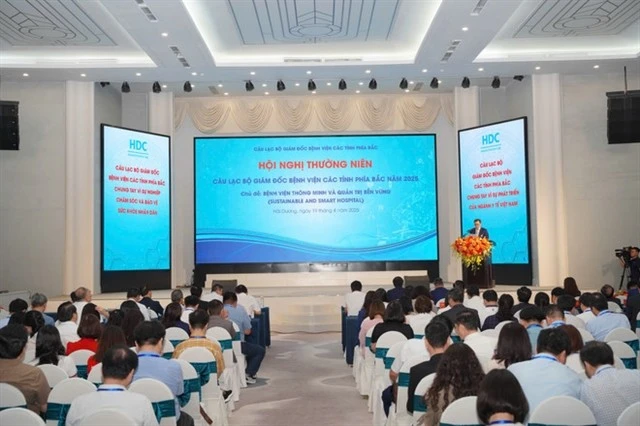
See more
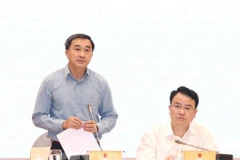
All citizens to receive annual free medical checkups: Deputy Health Minister
At the Government’s regular April meeting on May 6, Deputy Minister of Health Tran Van Thuan described Party General Secretary To Lam’s direction on the exemption of hospital fees for all citizens as a major and humanitarian policy, stating it is not a long-term strategy and a goal that the health sector is determined to implement, but also the one that touches the hearts of millions of people and meets their expectations.
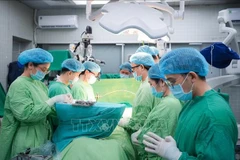
Brain-dead organ donor helps save six lives
Within 24 hours, the process of receiving the donated liver, two kidneys, two corneas, and skin to conducte transplantation for six patients was completed. The last surgery ended at 8:00 pm on May 3.

Vietnam targets aid for 100,000 beneficiaries in 2025 Humanitarian Month
Initiatives include visiting and gifting heroic Vietnamese mothers, martyrs’ families, veterans, and former youth volunteers in need; building Red Cross homes; supporting livelihoods for impoverished families; and upgrading school facilities.

One in every five Vietnamese children is shorter than they should be, say experts
Parents play a crucial role in tracking children's growth and implementing science-based interventions to address stunting and help improve children's height.
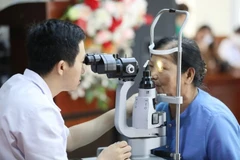
Vietnam among 21 countries to successfully eliminate trachoma
This marks a major milestone for Vietnam and its health sector after more than seven decades of persistent effort to combat trachoma.
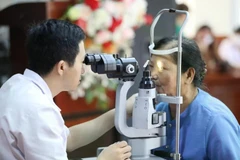
Vietnam officially eliminates trachoma as public health issue
Vietnam is now among 21 nations recognised for successfully achieving this milestone.
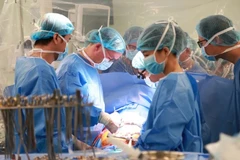
Vietnam performs first successful partial artificial heart implantation
The surgery lasted four hours. Two weeks post-implantation, the patient was able to walk and manage daily activities independently and is currently being guided through specialised care procedures in preparation for discharge.
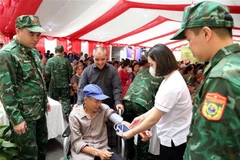
Free medical checkups provided for border residents
Running from April 12-13, the activity forms part of the 9th Vietnam–China Border Defence Friendship Exchange Programme, scheduled for April 16-17 in Vietnam’s Lang Son province and China’s Guangxi Zhuang Autonomous Region.

Symposium discusses comprehensive protection for cardiovascular-renal-metabolic patients
The symposium served not only as a platform for in-depth scientific exchange but also marked a significant step forward in the journey of treatment innovation, both in Vietnam and around the world.
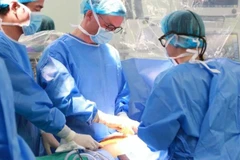
First third-gen artificial heart implant successful in Vietnam
The four-hour surgery was conducted by doctors from the 108 Military Central Hospital under the guidance of Professor Jan D. Schmitto, President of the Mechanical Circulatory Support (MCS) Programme and a world-renowned expert in the field.

Innovating for the Health of Vietnamese People, FPT Long Chau Honored at Healthcare Asia Pharma Awards 2025
FPT Long Chau Pharmacy and Vaccination Centre proudly represented Vietnam on the international stage as it was named “Digital Innovation of the Year” at the prestigious Healthcare Asia Pharma Awards 2025.
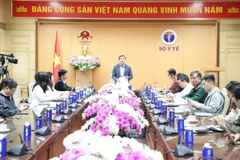
Infection control key to safer, higher-quality healthcare: Health official
The newly launched action plan, Thuan said, sets a strategic direction for nationwide standardisation of infection control practices, in line with national healthcare improvement goals and World Health Organization (WHO) guidelines.
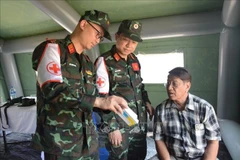
Vietnam's military medical force exceeds expectations on international rescue mission
Following the mission to assist Turkey in earthquake recovery in 2023, this marks the second time that the military medical force of the Vietnam People's Army has participated in international disaster relief efforts, with a substantial number of personnel and equipment deployed.
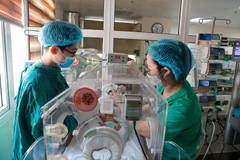
WHO lauds Vietnam’s strides in maternal, newborn health care
WHO has worked closely with Vietnam to build and roll out national policies and technical guidelines on maternal, newborn, and child health.

WHO urges accelerated action to save mothers, newborns
“Vietnam has made very impressive progress on safeguarding the lives of the youngest members of society and their mothers,” said WHO Representative in Vietnam Dr Angela Pratt.
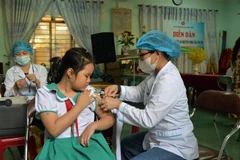
Nationwide immunisation drive ramps up amid measles outbreak risk
The Ministry of Health has issued an urgent directive for stricter measles control, as cases continue to rise nationwide, surpassing 2024 figures in the first quarter of 2025.
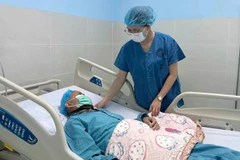
Autologous stem cell transplant brings new hope to multiple myeloma patient
Autologous stem cell transplant is an advanced treatment method that rapidly restores the patient's hematopoietic system after high-dose chemotherapy, helping to prevent life-threatening complications.
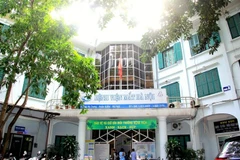
Hanoi invests in new 28 million USD eye hospital
The decision comes amid persistent overcrowding in the city's existing eye hospitals, particularly in public healthcare facilities, which have struggled to meet the growing demand for eye care services.

Health ministry proposes raising State health insurance contribution for students
For university students, which currently number around 2.8 million, the support level will remain at 30%.
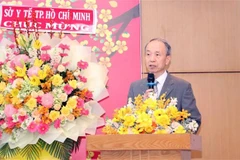
Japanese-standard maternity dental clinic opens in HCM City
Equipped with state-of-the-art facilities, the clinic specialises in providing advanced dental care for expectant mothers while also addressing future oral health concerns for unborn children.
